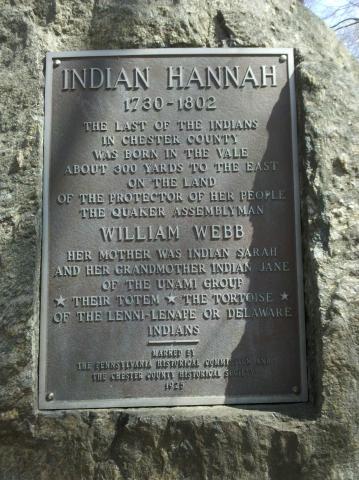Indian Hannah
Hannah was born in 1730 or 1731 to Lenape parents who lived on the property of Quaker William Webb in Kennett Township [now Kennett Square] in Chester County. Her family, which also included a grandmother, two aunts, and two brothers, typically spent winters in their cabins on Webb's property and then moved during the summer months to sites near Brandywine Creek, where they fished and planted corn. As the surrounding area became more densely settled with colonists, the Indians were squeezed out of their summer encampments, and many moved farther inland to the Susquehanna Valley. Hannah's father did so, removing with some other Indians from the Brandywine Valley to Shamokin on the Susquehanna River, but her female relatives chose to stay. 
In December 1763, a mob of frontier vigilantes known as the Paxton Boys murdered the Indians of ![]() Conestoga Indian Town, and they announced their plans to march on Philadelphia to kill any Indians they found there, as well as any Quakers protecting them. Shortly thereafter, Hannah and her family moved east across the Delaware River into New Jersey, perhaps on the advice of their Quaker neighbors in Chester County.
Conestoga Indian Town, and they announced their plans to march on Philadelphia to kill any Indians they found there, as well as any Quakers protecting them. Shortly thereafter, Hannah and her family moved east across the Delaware River into New Jersey, perhaps on the advice of their Quaker neighbors in Chester County.
After seven years, Hannah returned to Chester County with her mother, grandmother, and aunts (we do not know what became of her brothers). Hannah never married, and as her relatives died off, she found herself living with her white neighbors, earning wages or room and board for her sewing and basket making. Eventually, she reached a point in her life at which she had "almost forgot to talk Indian" and no longer liked "their [Indians"] manner of living so well as the white peoples."
As she grew aged and infirm, she took to "moving about from place to place making baskets and staying longest where best used," but always remaining within a local range of friends and neighbors who knew her well. She was among the first residents of Chester County's poor house when it opened in 1800, and she was buried on its property when she died there two years later.
http://explorepahistory.com/hmarker.php?markerId=1-A-226
Hannah Freeman dictated this brief life story to Moses Marshall, the overseer of the poor for Chester County, on July 28, 1797. Marshall was interviewing her to determine which township in Chester County should be responsible for her support, so the story focuses primarily on her family, places of residence, and employment.
"The Examination of Indian Hannah, alias Hannah Freeman Who saith that She was born in a Cabin on William Webb's Place in the township of Kennett about the year 1730 or 1731. The Family consisting of her Grandmother Jane Aunts Betty and Nanny. Her Father and Mother used to live in their Cabin at Webb's place in Kennett in the Winter and in the Summer moved to Newlin to Plant Corn–She was born in the Month of March. The family continued living in Kennett and Newlin alternately for several years after her birth as She had two brothers born there younger than herself. The Country becoming more settled the Indians were not allowed to Plant Corn any longer her Father went to Shamokin and never returned. The rest of the family moved to Centre in Christiana Hundred, New Castle County and lived in a Cabin on Swithin Chandler's place they continued living in their Cabins sometimes in Kennett and sometimes at Centre till the Indians were killed at Lancaster soon after which, they being afraid, moved over the Delaware to N. Jersey and lived with the Jersey Indians for about Seven Years after which her Granny Jane Aunts Betty and Nanny her Mother and Self came back and lived in Cabins sometimes at Kennett at Center at Brinton's place and at Chester Creek occasionally as best suited. This mode of living was continued till the family decreased her Granny died ab[ove] Skuylkill her Aunt Betty at Middletown, and her Mother at Centre. . . . she lived about two years worked at Sewing and received 3 / 6 [three shillings, six pence] per week wages . . . she worked a few weeks in some other places at Gideon Gilpins then went to her Aunt Nanny at Concord but having almost forgot to talk Indian and not liking their manner of living so well as white peoples She came to Kennett and lived at William Webbs worked for her board sometimes but got no money except for baskets, besoms, etc. She lived at Samuel Levis three years that is made her home and worked sometime, Received for her board no wages, but made baskets etc. and staying longest where best used but never was hired or received wages except for Baskets etc. . . ."
Credit: Marshall J. Becker, "Hannah Freeman: An Eighteenth-Century Lenape Living and Working Among Colonial Farmers," Pennsylvania Magazine of History and Biography 114 (1990): 251-52.

